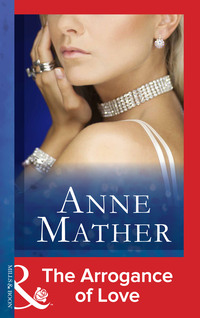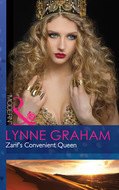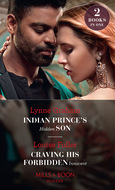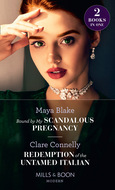Kitabı oxu: «The Arrogance Of Love»

Mills & Boon is proud to present a fabulous
collection of fantastic novels by
bestselling, much loved author
ANNE MATHER
Anne has a stellar record of achievement within the
publishing industry, having written over one hundred
and sixty books, with worldwide sales of more than
forty-eight MILLION copies in multiple languages.
This amazing collection of classic stories offers a chance
for readers to recapture the pleasure Anne’s powerful,
passionate writing has given.
We are sure you will love them all!
I’ve always wanted to write—which is not to say I’ve always wanted to be a professional writer. On the contrary, for years I only wrote for my own pleasure and it wasn’t until my husband suggested sending one of my stories to a publisher that we put several publishers’ names into a hat and pulled one out. The rest, as they say, is history. And now, one hundred and sixty-two books later, I’m literally—excuse the pun— staggered by what’s happened.
I had written all through my infant and junior years and on into my teens, the stories changing from children’s adventures to torrid gypsy passions. My mother used to gather these manuscripts up from time to time, when my bedroom became too untidy, and dispose of them! In those days, I used not to finish any of the stories and Caroline, my first published novel, was the first I’d ever completed. I was newly married then and my daughter was just a baby, and it was quite a job juggling my household chores and scribbling away in exercise books every chance I got. Not very professional, as you can imagine, but that’s the way it was.
These days, I have a bit more time to devote to my work, but that first love of writing has never changed. I can’t imagine not having a current book on the typewriter—yes, it’s my husband who transcribes everything on to the computer. He’s my partner in both life and work and I depend on his good sense more than I care to admit.
We have two grown-up children, a son and a daughter, and two almost grown-up grandchildren, Abi and Ben. My e-mail address is mystic-am@msn.com and I’d be happy to hear from any of my wonderful readers.
The Arrogance of Love
Anne Mather

MILLS & BOON
Before you start reading, why not sign up?
Thank you for downloading this Mills & Boon book. If you want to hear about exclusive discounts, special offers and competitions, sign up to our email newsletter today!
Or simply visit
Mills & Boon emails are completely free to receive and you can unsubscribe at any time via the link in any email we send you.
Table of Contents
Cover
About the Author
Title Page
CHAPTER ONE
CHAPTER TWO
CHAPTER THREE
CHAPTER FOUR
CHAPTER FIVE
CHAPTER SIX
CHAPTER SEVEN
CHAPTER EIGHT
CHAPTER NINE
CHAPTER TEN
CHAPTER ELEVEN
CHAPTER TWELVE
Copyright
CHAPTER ONE
SUSAN looked thoughtfully round the crowded lounge of Amanda Blake's apartment. The cocktail party which had begun at five o'clock showed no signs as yet of breaking up, and already it was six-thirty. She had told her fiancé that she would meet him outside their favourite coffee bar in Chelsea at seven, imagining, foolishly, that she would have time before that to return to the flat, which she shared with a friend in a Chelsea mews, to change. But now she would have to go to meet him as she was in the red velvet pants she was wearing, together with a close-fitting black sweater. Even so, there was no guarantee that she would be on time; Amanda Blake's apartment was in Mayfair, and in the rush-hour traffic on a Friday evening, when everyone who could was leaving the city for the less confining surrounds of the suburbs, the chances of getting a taxi to speed her there were very slight, and she would almost certainly be late. Poor David!
It was all very well, she thought gloomily, being secretary to a famous authoress, but Amanda was apt to forget that Susan had a life of her own, and her working hours often extended late into the evening. Not that Susan often objected. Usually, when they were engrossed upon a new novel of suspense, the kind Amanda Blake was noted for, Susan was as eager as Amanda to get on and discover the plot. But these literary cocktail parties, which always occurred at the publication of a new thriller, had begun to bore Susan, and she was always glad when they were over. Of course, it was exciting meeting the Press and other members of the literary fraternity, but tonight she had wanted to get away early to meet David Chalmers, and now she felt sure it was going to be one of those evenings when nothing went right.
She had been working for Amanda Blake for five years now, since she was a raw teenager of nineteen, and she enjoyed her work immensely. Since her engagement to David, though, things had become a little difficult. David objected strongly to Amanda monopolizing Susan's time. David was an architect, a very junior partner with a well-known firm here in the city, and they hoped to marry in the coming autumn. Amanda, Susan knew, was dreading that time coming. It would mean Susan leaving her, as David would not permit his wife to work at a job which occupied so many hours, and Amanda would have to initiate a new secretary into her ways. This would not be easy. Susan and she had such a grand relationship, and no other secretary would ever take Susan's place entirely.
Just then Amanda approached her secretary. Amanda Blake was a tall broad woman, in her late forties. Un-married, she had devoted her life to her work and her novels were very popular, both in this country and overseas, where they were translated into many different languages. Her work was of the kind which appealed to almost anybody and there had been talk recently of film rights and adaptations. Susan thought it all very exciting and knew that after she was married she would miss the world that Amanda moved in.
Of course, with the money she had amassed and a small private income, Amanda could have retired, but she enjoyed writing her thrillers as much as everyone enjoyed reading them and could not imagine life without a current who-dunnit on the go. Her hair, a mousey-grey, was cut short and straight. She wore tweeds whatever the occasion, and horn-rimmed spectacles completed a picture of stern solemnity. Not so, however, was the real Amanda, as Susan had soon found out. Quite contrary to her looks she had an unending fund of good humour and a dry and clever wit which endeared her to the columnists.
‘Enjoying yourself, Susan?’ she asked now, looking at the half-empty glass of gin and vermouth in Susan's hand. She was very fond of her young assistant and their association veered nearer to a mother-and-daughter relationship than that of employer and employee.
Susan smiled. ‘I thought it would have been over by now, Amanda,’ she replied, sighing.
‘I expect you've got a date with that young man of yours,’ remarked Amanda dryly. ‘Let him wait. Good for the soul, you know. Absence makes the heart grow fonder and all that.'
Susan laughed. ‘You always say that,’ she answered. ‘And David does quite a bit of waiting for me. What time is this likely to dry up?'
‘Sevenish,’ said Amanda. ‘Will that do?'
Susan opened her mouth to reply when an eager reporter beat her to it and bore Amanda off to discuss some aspect of the new novel.
Sighing again, Susan turned and walked into the large modern kitchen which adjoined the lounge, and poured the remains of her drink down the sink. She had had four gin slings already. She did not want to meet David in an intoxicated condition. He was a teetotaller and disapproved of alcohol.
She drew a pack of cigarettes out of the pocket of her slacks and lit one and then looked critically at her reflection in the mirror above the draining board. Green, sleepy eyes looked back at her, veiled by long black lashes, while her ash-blonde hair hung loosely to her shoulders where it curved up lightly at the ends. Her hair was thick and silky soft, and did not need to curl to be attractive.
Suddenly, she became aware that someone was watching her from the doorway which led to the tradesmen's entrance of the apartment; someone who was very big and broad and darkly attractive, with raven's-wing dark hair which was inclined to curl on his collar. Dressed in a thigh-length overcoat and a dark suit, he was quite the most physically attractive man she had ever seen; he was so completely male, and estimating that he was about thirty-five, she imagined she would not be the first, or the last, woman to think so.
Aware of a kind of breathlessness about her, she managed to say: ‘Who on earth are you?'
‘A newspaper man,’ he remarked, non-committally.
Susan flushed beneath his gaze, annoyed at feeling suddenly so inadequate. Being a tall girl herself, she usually was on eye-level terms with the men of her acquaintance. This man dwarfed her, and immediately put her at a disadvantage.
‘The … the cocktail party guests usually use the front door,’ she said, managing to sound cool, though she felt far from it.
He shrugged his broad shoulders and lit a cigar.
‘I prefer to see A.B. alone,’ he answered smoothly.
Susan ran a tongue over her dry lips. ‘Really! And will she want to see you?'
‘I think so,’ he murmured. ‘Amanda and I are old friends. Unfortunately we seldom see anything of each other.'
‘Well, if you go through you can see her now,’ said Susan, running a nervous hand through her hair.
‘I'll wait until the rabble have gone, if you don't mind,’ he replied casually. ‘I've been abroad for some considerable time, and I'd like to see the old girl alone.'
Susan was shocked. How dare he address Amanda Blake as ‘the old girl'? Who was he?
She turned to go intending to tell Amanda immediately that he was here. After all, she only had his word that he knew her employer at all. But he caught her wrist as she passed him and stopped her.
‘Don't go,’ he murmured. ‘Stay and keep me company. How about getting me a drink?'
Susan wrenched her wrist out of his grasp. His touch had sent the blood pounding through her veins, and she realized with horror at her own duplicity that she had enjoyed the feel of those hard fingers gripping her arm.
‘If you want a drink, you'll have to go in there for it,’ she said angrily.
He grinned. ‘If I remember correctly, A.B. used to keep a bottle of Scotch in the cupboard over the refrigerator, for medicinal purposes such as this.'
Susan clenched her fists. She crossed to the cupboard he had mentioned and, sure enough, at the back stood the bottle of Scotch. Really, she thought, he seemed to know an awful lot!
She lifted the bottle out, took a glass from the drainer and poured him a drink. ‘Ice?’ she queried, in a voice as cold as ice itself.
‘Naturally.'
Susan took the tongs and lifted two large pieces of ice out of the ice container and dropped them into the amber liquid. Then she handed him the glass. The man took it, nodding his thanks. Susan stubbed out her cigarette in the near-by ashtray, and he said:
‘Won't you join me?'
‘No, thanks,’ she replied shortly, glancing at her watch. It was almost seven now.
‘Got a heavy date?’ he asked. ‘You're A.B.'s secretary, aren't you?'
‘Yes, to both questions,’ she answered, acutely conscious of him. She turned to look at him again; she had been avoiding his eyes but suddenly she found her eyes held by his and something seemed to flare in his at the contact. It was fantastic, crazy, and yet she felt drawn to him; something dangerous and exciting and forbidden seemed to be in the room. He must have felt it, too, for his eyes narrowed slightly, and he looked at her through half-closed lids. Susan wondered whether the amount of alcohol she had consumed was clouding her brain. This was all so – so – mad!
She forced herself to look away, and said, breathlessly: ‘I must go back.'
All at once the door from the lounge opened and Amanda stood there.
‘They've all gone now—’ she began, and then stopped in amazement. ‘Dominic – Dominic Halstad!'
The man smiled, his eyes dancing, and Amanda rushed across the room and hugged him warmly. Over her shoulder, the man's eyes sought Susan's and she had to steel herself to force things back into perspective.
For, as Amanda made a fuss of the man, chattering volubly, the name she had used caused Susan no little feeling of trepidation.
Dominic Halstad! No ordinary newspaper man as she had assumed. He was the chairman of the board of directors of Halstad Press Limited, one of the largest syndicates of newspapers and magazines in the country.
If she had not felt so strange she would have felt like laughing. And she had thought he was trying to get an inside story! She turned away and lit another cigarette with trembling fingers. Dominic Halstad! Glory!
Then Amanda was saying: ‘Susan, my dear, come and meet one of my closest and oldest friends, Dominic Halstad. You've heard of him, of course.'
‘Of course,’ murmured Susan politely, flushing as his firm fingers gripped her hand for a moment and then released it again.
‘Miss … er …?’ he began slowly.
‘Stacey,’ put in Amanda swiftly, ‘but I'm sure Susan will do, won't it, darling?'
‘Of course,’ said Susan, again, feeling rather ridiculous because she could think of nothing else to say.
‘Well, Susan has been looking after me,’ said Dominic Halstad lazily. He was completely in control of himself, and Susan thought she must have imagined the look in his eyes a moment ago. Which was just as well, she thought dryly. If his name had told her nothing else, it had at least warned her that he was a married man.
Amanda smiled. ‘Susan's a real treasure,’ she said, putting an arm about her secretary's shoulders.
‘Of course we didn't introduce ourselves properly,’ continued the man mockingly.
Susan felt uncomfortable and as though sensing it, Amanda said:
‘You can get along now and meet that young man of yours, Susan.'
‘Thank you,’ said Susan, with relief. ‘Good-bye, Mr. Halstad.'
She hurried out into the living-room where Amanda's maid and general factotum, Sarah, was trying to create order out of the disorder of dirty glasses and overflowing ashtrays that was left.
‘G'bye, Sarah,’ she called, and, pulling her sheepskin coat about her shoulders, she left the apartment.
She managed eventually to hail a taxi, and giving the address of the coffee bar she sank back against the leather upholstery. Feeling able to relax she found her thoughts turning back to the last few minutes at the apartment and her encounter with Dominic Halstad.
She had treated him like an intruder, and she wondered whether he would tell Amanda how impolite she had been.
He had been attractive though. Susan sighed, and wondered what his wife was like. Although she knew he was married she could not remember ever having read anything about his wife. His name appeared from time to time in the city society magazines, and recently she had read about him in America, but his wife did not seem to accompany him very often.
David was waiting impatiently outside the coffee bar. He was striding up and down, trying to keep warm, for it was a cool March evening. He looked disgustedly at her trews and the sheepskin coat. He did not like to see women in trousers, least of all his fiancée. He was rather old-fashioned, and although at times Susan found it rather endearing, at others it exasperated her.
‘Do you realize it's seven-thirty?’ he exclaimed, by way of a greeting.
‘Yes, darling,’ said Susan, in a mock-subdued tone. ‘I'm sorry.'
‘And I gather, from the way you're dressed, that you haven't been home since this morning.'
‘Correct,’ she murmured. ‘You know I told you that Amanda was having the cocktail party for the new book this afternoon. That's why I'm so late. It's only just broken up.'
David snorted. ‘Susan, you're not paid to attend that woman's cocktail parties!'
‘I know, David, but she does so like me to be there, and I don't like to disappoint her.'
‘It doesn't matter about disappointing me, of course!'
‘Oh, David, don't be silly. I haven't disappointed you. I'm here, aren't I? Come on, let's go in, I'm starving!'
‘We aren't going in,’ he said abruptly. ‘Mother has invited us back for supper. She wants to discuss the wedding.'
He ignored the way Susan's face dropped at this news. Susan and Mrs. Chalmers did not get along very well. Mrs. Chalmers was a widow, and David was her only child. Consequently, she was rather possessive and jealously did not want him to marry and leave her. David was tall and slim and fair, and she had brought him up to despise most of the members of her own sex. He did not smoke or drink and attended church with her twice every Sunday.
When he met Susan, one day in the tube (he accidentally sent Susan's shopping flying when he bumped into her), he found all his mother had told him accounted for little against his own attraction for the blonde, green-eyed creature who thanked him so merrily for picking up her parcels.
He could hardly believe his luck the following evening when they again travelled on the same train, and when he asked to see her again she agreed eagerly.
But when he took her home a few weeks later to meet his mother, he found things were not going to be as smooth as he had hoped. Mrs. Chalmers spent the whole evening sulking and Susan could hardly wait to escape from the close confines of Medlar Grove.
As time went by, and Mrs. Chalmers realized that David was not to be swayed from Susan, whatever she said, she tried to be a little more friendly, and finally decided that if David was to marry Susan, she might as well make the best of it. After all, they could nicely live with her after the event. The house was old and large for one person and that way she would be able to keep David under her roof. Things would not be so different after all.
But Susan soon realized the way things were going and lost no time in saying that she and David hoped to be able to save enough money to put a deposit down on a small house in one of the new suburban developments.
Mrs. Chalmers, however, was no defeatist, and still would not accept that David would agree to such a thing and leave his mother alone. Thus it was that David was being pulled two ways, and was not yet strong enough to defy his mother and make a stand.
Susan herself was hoping that he would not allow his mother to get her own way, as she knew she could never live with Mrs. Chalmers. They were too different, and it would never work out.
Now, Susan merely sighed, and said: ‘Oh, all right, David. But I wish you wouldn't spring these things on me. I've been looking forward all day to this evening alone together.'
David relented a little, and replied, ‘Never mind, Sue darling, we don't have long to wait and then we'll be together for always.'
‘Y … e … s,’ murmured Susan, rather cautiously. Their future had never seemed more insecure. What was wrong with her? Why was she feeling so depressed tonight? It could only be this sudden visit to Medlar Grove. What else was there?
She refused to allow herself to think about that moment in Amanda's kitchen. What was she, that she could allow herself, even for a moment, to respond to the message in another man's eyes? A message which she felt she had imagined anyway.
David ran a small M.G. sports car of almost vintage origin, and they drove in it round to David's home in Shepherd's Bush. Mrs. Chalmers let them in. She must have been watching for them from the window, and Susan shivered at the pictures this conjured up. Pictures of their lives in a few years’ time if they lived here. No, it could never be. And if love was involved, she realized with a sense of loss that she did not love David enough to submit to such a life.
When she saw Susan's trousers, Mrs. Chalmers exclaimed, ‘Dear me, I hope none of the neighbours saw you come in!'
It was on the tip of Susan's tongue to say that if all the street were like Mrs. Chalmers, there was every chance that she had been seen. But respect for David made her refrain and she simply ignored the remark, and walking into the gloomy living-room warmed her hands at the electric fire.
‘Susan didn't have time to change before she came,’ said David by way of explanation when Susan did not answer herself.
‘Why? You're late enough, aren't you?'
David sighed. ‘Susan had to work late.'
‘And have you been standing around in the cold waiting for her? You'll catch your death of cold one of these days, mark my words.'
‘He's not made of glass, you know,’ Susan was stung to reply at last. ‘And I couldn't let him know.'
Mrs. Chalmers shrugged and left them for a few minutes to prepare the supper. Susan took off her coat and laid the table while David switched on the television and began to watch a quiz programme.
Susan looked at him and sighed. He was not a very romantic person, and it had never occurred to him that he had not yet kissed her, or told her he was glad to see her. Unless he was prized away from his mother's apron-strings he never would. This atmosphere was cloying. It sapped all original thought. Mrs. Chalmers was in evidence everywhere. From the ridiculous ‘Home, Sweet Home’ embroidered picture on the wall to the swear box on the mantelpiece.
Supper as usual was a concoction of scrambled eggs and bacon and after it was over Susan defiantly lit a cigarette. She did not smoke a lot, but tonight she felt so restless she had to do something to calm her nerves. She drew the smoke deeply into her lungs and then exhaled with satisfaction.
As usual, the conversation veered to the subject of the wedding. As Susan had no relatives of her own, Mrs. Chalmers had taken over the arrangements herself, and, of the forty guests on the list, only about a dozen were friends of Susan's.
The question of the house was raised, and Mrs. Chalmers again made her point about this house coming to David on her death anyway, and that to buy a new house was quite ridiculous and much too extravagant.
‘David doesn't want to be troubled with mortgages at a time like this,’ she said severely. ‘After all, this house is far too big for one person. And if David leaves I shall be all alone.'
‘You could sell it,’ Susan remarked quietly.
‘What! Sell my home! Then what would I do?'
Suddenly afraid that Mrs. Chalmers, or David for that matter, might suggest that she come to live with them should they buy a new house, Susan said quickly, ‘You could afford to buy a smaller house. Or alternatively, you could rent a flat. In fact, a flat would suit you admirably.'
‘A flat!’ Mrs. Chalmers’ face was red. ‘I couldn't live in a flat!'
‘Why not?'
Mrs. Chalmers swallowed hard. ‘You wouldn't understand, never having had a home of your own, but a home is something more than three up and two down, you know.'
Susan flushed. It hurt still, when anyone spoke so crudely of her upbringing. Truthfully the orphanage had been a wonderful place, and she still went back there sometimes to see the Matron, but it had not been quite the same as a real home, with a mother and father of her very own. She was sure that this was something else that marred her in David's mother's eyes. She seemed to look down on orphanages, as though the children in them were themselves responsible for their lack of parentage.
David must have felt uncomfortable himself at this, for he suddenly stretched and rose to his feet.
‘Well, Sue, it's nearly ten. Shall we be going?'
Gratefully, Susan rose also. ‘Oh, yes, David. Can you get my coat?'
Outside, the night air seemed inestimably fresh after the dingy atmosphere of the Chalmers house. Susan breathed deeply and was glad for once that the car was an open one. It was wonderful to feel the cold wind tugging at her hair, and clearing her head.
She wished David was not so easily dominated by his mother. For instance, he never chastened her for anything she said to herself, Susan, whatever it might be, and for all she might think that it was because he wanted to keep the peace she knew this was the coward's way out. Mrs. Chalmers might not be so objectionable if she were taken down a peg or two, now and then.
It was a problem, and she did not have any idea how it was to be solved.
When they drew up outside the block of apartments where Susan's flat was situated, she turned to David and said:
‘David, let's get this straight now, shall we? I don't want to live with your mother, however convenient it may be.'
David sighed. ‘I know, Sue, but –'
‘But nothing, David.’ Susan ran a hand over her hair, and David suddenly pulled her to him.
‘Oh, Sue,’ he whispered, ‘I only want to live with you. I don't care where it is!'
Susan allowed him to kiss her, without responding herself. She felt emotionally exhausted at the moment. Then she pressed herself against him, as though willing herself to respond, and he groaned, ‘Oh, lord, I don't know how I'll wait until October.'
‘What would your mother think?’ she taunted him, hating herself for doing so.
‘I don't damn well care,’ he muttered, and kissed her again.
Pulsuz fraqment bitdi.








